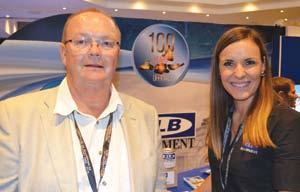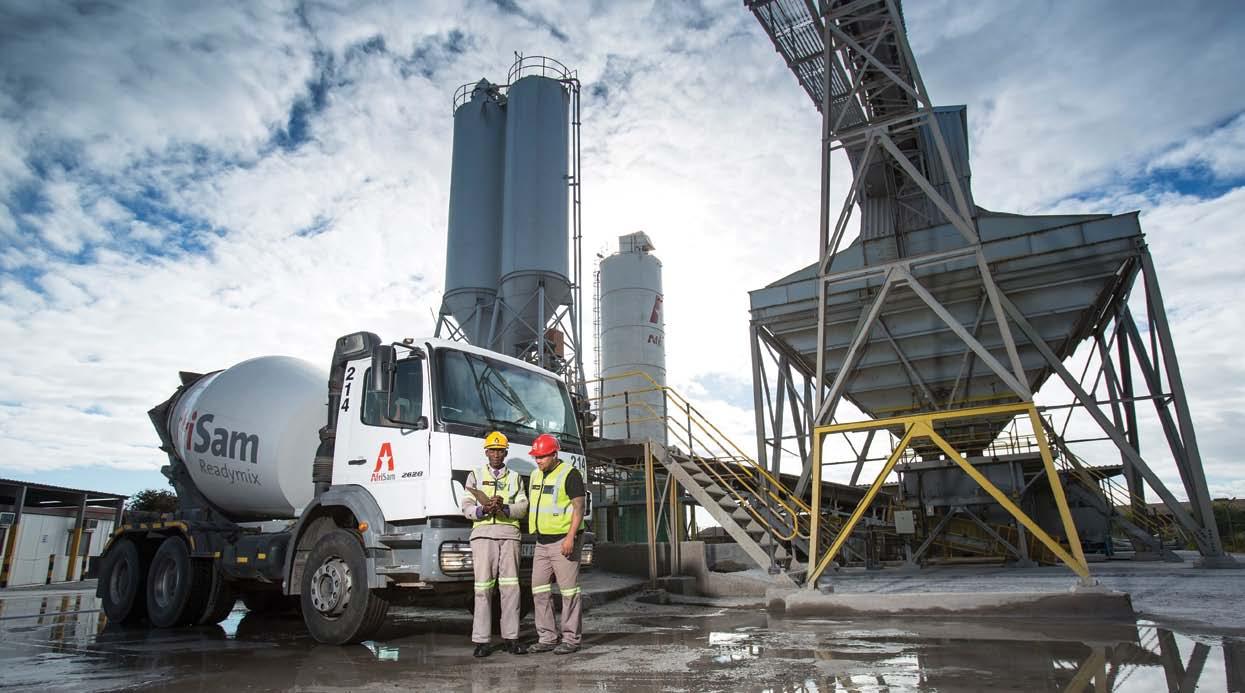
7 minute read
Aspasa
Cement production starts with mining: Aspasa’s initiatives
By Eamonn Ryan
Advertisement
Nico Pienaar, director of Aspasa on the left.
Aspasa members are an integral part of cement and concrete production: the most mined mineral in the world is aggregate and sand. Without aggregate and sand there would be no concrete, and consequently no dams, roads, schools or any type of infrastructure.
“ninety-five percent of any road is made of these two products, bound together either with cement or bitumen,” says Nico pienaar, director of aspasa, the voice of the surface mining industry in South africa. “It is crucial to the manufacture of concrete and consequently vital that people who manufacture cement and concrete buy quality sand and aggregate. Not all sand or aggregate is the same – there are vastly different qualities. For instance, if you take sand from a beach and make concrete with it, that concrete will fail because the sand contains seasalt, while concrete made from inferior aggregate that is too fine may break up.
“this is the explanation for the many public roads on which we see rutting: the foundations aren’t right and the aggregate hasn’t been correctly compacted. limestone is one of the key components of cement and is also widely mined by aspasa members and put through a furnace to make the cement.
“Illegal mining is taking place and it is a major threat to the mining industry – not just of aggregate and sand, but of gold, platinum, diamonds and every mineral. We are working on this threat at tempo with the Minerals Council to establish a task team. In the case of sand and aggregate, illegal miners are digging sand out of rivers or beaches, destroying the environment and selling it cheaply on the market. being illegal, it is also antisocial as they pay no tax to the country and do not comply with any regulations, including health and safety..
“there would be no illegal mining of sand and aggregate unless the industry itself was buying it. It is like the people who steal copper cables – if there wasn’t a purchaser then they wouldn’t steal it. there is a ready market. If legitimate construction companies, municipalities, road builders and the entire value chain were to request a certified copy of the mining licence to accompany each purchase of sand and aggregate, and a record of source, then illegal mining would decline. readymix companies buy sand because it’s cheap but have no knowledge of the quality of that sand because it isn’t tested or audited, and no understanding of what environmental damage was perpetrated while mining it.
“We are in the process of bringing out a document which deals with illegal mining in the light of new environmental legislation which is shortly to be put out for comment. this will affect cement producers as the cement (in the form of limestone) has as its first step to be mined. aspasa is involved in a number of initiatives: • It has long been heavily focused on health and safety in mines, and the audit of mining standards. • More recently, environmental issues have assumed equal importance, says pienaar. “When you have a nearby community, environmental issues are key to their quality of life as they experience the dust and blasting. unfortunately our environmental initiative had to take a back seat during the two years of Covid when we weren’t allowed to audit – but we have resumed in full this year.” • Aspasa is focused at the current moment on the enforcing the quality of aggregate products, the testing of aggregate and laboratories’ testing. “In the past, testing was not at a level it should be and little accountability for the process. today, testing of the aggregate is a professional function within a mine to ensure the end product is of a high quality for the end users in the cement and concrete industry.” • Aspasa has appointed an explosives expert with military and bomb experience, who subsequently worked for a number of mines, to ensure that explosions are conducted properly on mines. “We appeal to mines to ensure that their paperwork on explosives and explosions is in order because there are criminal consequences if someone gets injured or someone’s property is damaged.” • Traffic management in mines is also receiving growing attention, with proximity detection Systems (pdS) becoming the norm in order to limit accidents and injury to workers, similar to what many newer model cars have. “aspasa is pushing for mines to implement a formal traffic management system based on a common-sense principle of requiring all vehicles to move in the same direction on any road, and to keep people away from where machines are working.” • Aspasa has launched a new initiative called Young professionals to encourage young people to join the industry and gain work experience. It was prompted by Covid19 and the trend to working from home. this meant that young people no longer had mentors or people they could gain work skills from. • Women in mining has long been an initiative of the mining industry, and aspasa is cultivating a more nuanced approach. a policy that singles out women can often be a step backwards as opposed to an advance. “We talk about gender Justice in Mining instead of Women in Mining to break down gender stereotypes. It is a broader concept that embraces a range of women’s agency and autonomy from sexual harassment to unfair discrimination, and more,” explains pienaar. there are the usual ad hoc issues which aspasa has to respond to in the field of regulation. pienaar says that with the demise of Sarma (South african readymix association) that growing industry has become “a free-for-all” with no order or audits, and no cooperation.
“however, the major challenge facing all of us in this industry is infrastructure development, or the lack of it. the government has repeatedly said it will allocate money for infrastructure, as recently as the latest National budget and president’s State of the Nation speech. It is crucial that we have a proper infrastructure, and it will also be a boost for all the sectors involved in the value chain of the construction industry. however, once this does start to take off it is crucial that companies buy sand and aggregate from a legal source,” says pienaar. n
STAying flExiblE

to deliver quality despite tough times
Supplied by Afrisam South Africa’s construction material players continue to grapple with a depressed economy, but pockets of opportunity have emerged, says AfriSam construction materials executive Avi Bhoora.
With a lifetime of experience in construction, bhoora acknowledges a tough decade since the end of major infrastructural investments related to the FIFa Soccer World Cup. When it looked like conditions could not get any worse, the Covid-19 pandemic precipitated an even further decline from early 2020. For suppliers of construction materials, the task has been to continue adapting and cutting their coat to suit the cloth, he says.
“the Covid-19 lockdown was when the industry hit a real cliff and projects dried up overnight, with just no activity,” he says. the company was also realistic about the future, anticipating not a quick bounce-back but a slower recovery. this describes an economy with a slow improvement, accompanied by persistently high unemployment and low growth. Indeed, this forecast has been generally correct, he says, although there h–ave recently been pockets of opportunity that afriSam has grasped.
“In the Cape, there has been the N7 highway project and some smaller private developments which we have served with our peninsula quarry,” he says. “While important road projects in kwaZulu-Natal are taking time to finalise, some of these have gone ahead and are bringing some relief to contractors and their supply chains.”
however, while the coastal provinces have seen some progress the inland areas remain in the doldrums. low business confidence levels have even subdued the pipeline of privately funded projects. he also notes that ongoing challenges include the efforts of illegitimate ‘business forums’ to stall projects, and a long spell of inclement weather since the last quarter of 2021.
RIghT-sIzIng
a proactive Covid-19 recovery rescue plan at afriSam has demonstrated the company’s strategic flexibility and its solid in-house core of industry knowledge and tactical expertise. Avi Bhoora, AfriSam bhoora highlights that the experienced manconstruction materials agement team, with the support of the board, executive was able to navigate this difficult process independently – without having to rely on outside consultants. “We put our operations into three categories,” he says. “In the first category, operations would continue as required. In the second category they would be put on care-and-maintenance, and in the third category we would exit from the operation completely.” Where operations would be continued, production was adjusted to suit demand. guided by the ‘tonnes per man’ measurement, the head count was aligned and work schedules











